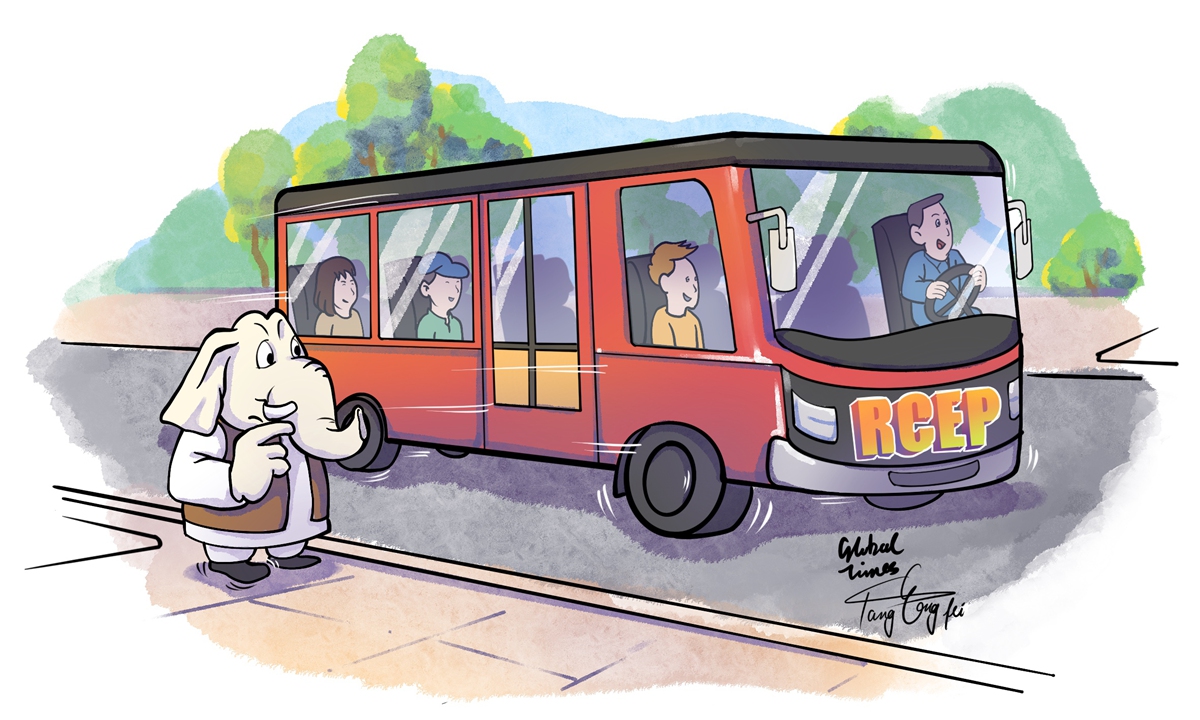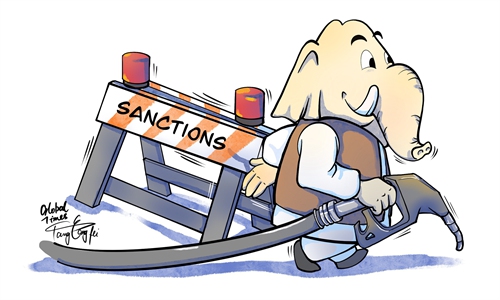
Illustration: Tang Tengfei/Global Times
Over two years after India decided to quit negotiation of the Regional Comprehensive Economic Partnership (RCEP), the mega regional trade deal's door is still open to India, a senior Japanese official said recently.Keep staying out of the RCEP could impact "India-Japan collaborations in other countries" and make it more difficult for products that have an Indian components to be sold easily in RCEP markets due to the mega deal's "Rules of Origin" clause, the Hindu reported on Sunday, citing Japan's Cabinet Secretary for Public Affairs Noriyuki Shikata.
Japan has been trying to persuade India to join the RCEP since the beginning of the negotiation, with one of its intentions attempting to counter China's "influence" under the framework. However, regardless of the confrontational mentality of Japan, rejoining RCEP indeed is of great significance for India, especially when its economy is struggling amid the COVID-19 pandemic as well as the added pressure of the Russia-Ukraine conflict.
India dropped out of the RCEP negotiation in November 2019 after seven years of marathon talks. Behind the decision was India's long-standing protectionism. Despite Modi administration's inclination to take market measures to boost economy, it has been facing strong headwinds from different domestic interest groups.
India is a country with a long history of adopting both tariff and non-tariff protection measures; and the country has developed an extremely unbalanced industrial structure with services sector as a mainstay and a remaining low proportion of manufacturing in its economy.
Though New Delhi, in recent years, has rolled out massive investment projects, claiming to improve the business environment to attract foreign investment, and enhancing manufacturing development, the result is far from being satisfactory.
The largest South Asian economy had seen declining momentum even before the pandemic, not to mention the repeated hit it has been taken from the pandemic and the recent Russia-Ukraine situation.
Under such circumstances, it is possible that India may re-consider its choices in front of an open door of RCEP, given the trade deal's large membership, rich resources and great market potential. The deal was inked one year after India's dropout and has come into effective since the beginning of the year, containing about 30 percent of both the world's GDP and population.
Many of India's raw materials, technologies and others are sourced from or export to markets in the Asia-Pacific region. Joining the RCEP would enable India to integrate into the regional economy more quickly and access various resources to support its steady economic growth.
Integrating to regional economy does not necessarily conflict with India's independent development. As the world's sixth largest economy, India has an ambitious goal of becoming a regional powerhouse, with some in India viewing China as a rival which was also a reason lurking behind its decision of dropping out of the RCEP talks.
However, such anti-China notions are biased and mostly driven by political reasons. In fact, India is currently short of capacity to compete with China among the global industrial chain; instead, it is integrating to the regional development and cooperating with China, the world's leading manufacturing powerhouse, which would greatly boost India's industrial development and economic growth in the long run.
It would be a hard step for New Delhi if it chooses to rejoin the economic bloc, but the benefits and advantages of joining are clear to see. Though India has stepped up efforts to conclude bilateral trade deals, they are not comparable to the advantages of regional trade agreements. And it needs to be pointed out that the open door for India does not mean that India could make bargains as it wants; necessary limits need to be put in place if the negotiation with India restarted.
The article is compiled based on an interview with Liu Zongyi, secretary-general of the Research Center for China-South Asia Cooperation at the Shanghai Institutes for International Studies. bizopinion@globaltimes.com.cn



